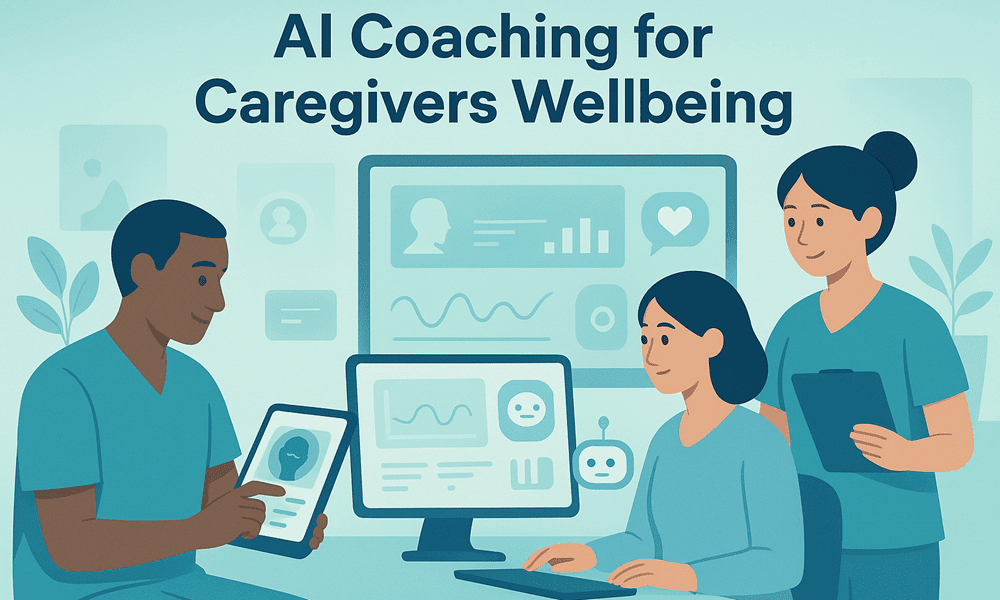Employees working in caregiving or support-oriented roles carry a type of stress that builds quietly over time. Whether they are nurses, healthcare assistants, school counselors, social workers, or corporate employees in people-facing positions, their work requires emotional labor every single day. As a result, caregivers often struggle with worry, exhaustion, and empathy fatigue long before anyone notices the signs.
This is why organizations are beginning to use AI coaching for caregivers wellbeing, a structured, proactive support model that blends emotional guidance, automated coaching, and intelligent stress monitoring.
For many companies, especially those with large caregiving teams, this shift is helping reduce burnout, stabilize morale, and protect long-term performance. A growing trend is connecting these tools to broader wellbeing frameworks like AI for healthcare worker wellbeing.
Why Caregivers Need Specialized Support
Unlike typical workplace stress, caregiving roles involve constant emotional attention. Employees listen to worries, manage crises, calm distressed individuals, and handle emotionally charged conversations daily. Over time, this leads to empathy fatigue, a pattern where the mind becomes tired from repeated exposure to others’ needs.
This is where tools built around caregiver burnout AI have become important. They help organizations identify early signals—irregular behavior patterns, mood withdrawal, heavier digital load, or reduced engagement. These indicators often show up weeks before burnout becomes visible. Managers who use these insights alongside AI compassion fatigue prevention have a clearer path to support their teams.
Understanding the Modern Caregiver Burden
Across healthcare and high-care industries, burnout has reached worrying levels:
- More than 60% of frontline caregivers report emotional exhaustion at least once a week.
- Nearly 1 in 3 nurses consider leaving their jobs due to chronic stress.
- Social workers report some of the highest stress scores across all professions.
These numbers highlight why healthcare stress support isn’t only a “nice to have,” but a business necessity. The pressure on these employees affects performance, retention, patient satisfaction, and workplace safety. Many leaders are now grounding their support systems in AI psychological first aid to offer consistent help.
How AI Coaching Models Support Caregiver Wellbeing
AI coaching tools use gentle prompts, emotional check-ins, and personalized suggestions to help caregivers stay mentally steady during long work cycles. Instead of waiting for burnout to surface, AI keeps track of indicators such as mood changes, sleep drift, or stress wording patterns.
Key functions of AI coaching for caregivers wellbeing
| Feature | Benefit for Caregivers | Benefit for Organizations |
| Real-time emotional check-ins | Reduces bottled-up stress | Better understanding of workload pressure |
| AI-guided coping tools | Helps manage empathy fatigue | More stable team performance |
| Pattern recognition | Spots early signs of burnout | Helps adjust shift plans or tasks |
| Reminder nudges | Supports healthy routines | Lower turnover and absenteeism |
| Scenario-based learning | Builds emotional resilience | Better quality of care |
These functions help employees manage heavy emotional load and give managers clear insights to support wellbeing goals, especially when paired with AI coaching for leaders.
Reducing Empathy Fatigue Through Early Detection
Empathy fatigue, also known as “compassion overload,” is extremely common among caregivers. It usually shows up in small ways—shorter patience, irritability, emotional numbness, or disengagement from work.
Tools built around empathy fatigue prevention use simple, friendly interactions to understand emotional strain. AI systems analyze patterns such as:
- Frequent late-night log-ins
- Repetitive stress signals in messages
- Sudden drop in mood scores
- Lower participation in team activities
When a pattern becomes concerning, the caregiver receives personalized guidance, grounding exercises, or prompts encouraging them to slow down. Leaders receive de-identified reports showing the overall team risk level, which helps them take action using AI stress reduction as part of their wellbeing strategy.
Building Emotional Strength With AI
Many caregivers carry the stress home, even after shift hours or high-care interactions. This makes emotional resilience an essential part of any wellbeing program. AI coaching helps by offering small, practical exercises that can fit into a busy schedule.
Ways AI builds emotional resilience
- Sharing micro-coping tips during stressful moments
- Guiding short breathing or grounding routines
- Helping caregivers label emotions instead of suppressing them
- Offering small reflection prompts
- Recommending break reminders or recovery time
These steps help maintain AI emotional resilience throughout the week, especially in shifts where emotional load fluctuates unexpectedly. The process becomes smoother when it is integrated into a system already using AI for healthcare worker wellbeing.
Caring for the Mental Load in Support Roles
Support teams in healthcare, education, elderly care, HR, and community support deal with emotional labor daily. The pressure doesn’t always come from physical tasks—it often comes from the mental load of managing others’ feelings and expectations.
Using support role wellbeing tools, organizations can map the emotional demands of each role and personalize care routines accordingly. These insights help managers avoid accidental overload when scheduling tasks or assigning sensitive cases. The results improve steadily when aligned with compassion fatigue prevention.
How AI Coaching Blends Into Daily Caregiver Routines
One strength of AI support tools is their subtle integration into daily workflows. Employees don’t need extra training or complicated systems. The technology adapts to their pace and work style.
Examples of AI supporting caregivers daily
- A nurse working a delayed shift gets a stress-management nudge after three high-tension patient interactions.
- A school counselor receives a reminder to pause for two minutes after consecutive emotional conversations.
- A home-care assistant gets a sleep recovery suggestion after several days of irregular patterns.
- A social worker receives a reflection question after closing a difficult case.
These moments create mental “breathing space,” helping caregivers stay emotionally balanced and reducing the risk of burnout. Integrating these steps alongside psychological first aid strengthens the overall support network.
Business Value: Why Companies Are Prioritizing AI Support for Caregivers
Supporting caregivers is not only an ethical responsibility—it also protects business stability. Burnout-driven turnover is extremely costly, especially in healthcare and high-care sectors.
Key organizational benefits
- Lower training and replacement costs
- Reduced absenteeism
- More predictable workforce planning
- Higher morale and job satisfaction
- Better patient or client experience
A recent survey of healthcare organizations found that teams using automated coaching tools had up to 28% lower burnout scores compared to those using only manual interventions. Companies also noted improved incident response time and calmer team communication when using systems connected to AI stress reduction.
Industry Example: Healthcare Organization
A mid-sized hospital group in the US introduced caregiver burnout AI across 1,200 staff. Within six months:
- Emotional fatigue dropped by 19%
- Sick days reduced by 13%
- Team connection scores improved by 27%
Nurses reported feeling more “mentally prepared” for heavy shifts, while managers gained clear visibility into stress patterns. Leadership layered these insights with AI coaching for leaders to create a more responsive care structure.
The Future of AI Coaching for Caregivers
The next wave of AI support tools will likely combine:
- Predictive mental health risk scoring
- Advanced voice-pattern stress detection
- Personalized micro-coaching paths
- Integrated wellbeing dashboards
- Real-time workload stress alerts
These improvements will help organizations stabilize high-care roles, reduce turnover, and support long-term mental wellbeing. The future will favor employers who invest in emotional safety and build systems that protect caregivers from carrying invisible burdens for too long.
Conclusion
Caregivers hold some of the most emotionally demanding roles in any organization. They support others, solve sensitive problems, and carry emotional pressure that often goes unseen. By using AI coaching for caregivers wellbeing, companies can finally create structured, daily support that helps employees feel understood, valued, and emotionally steady.
For corporate owners looking to maintain a resilient and compassionate workforce, AI-driven coaching offers a practical pathway—one that strengthens emotional health, protects performance, and creates a healthier future for those who take care of everyone else.







